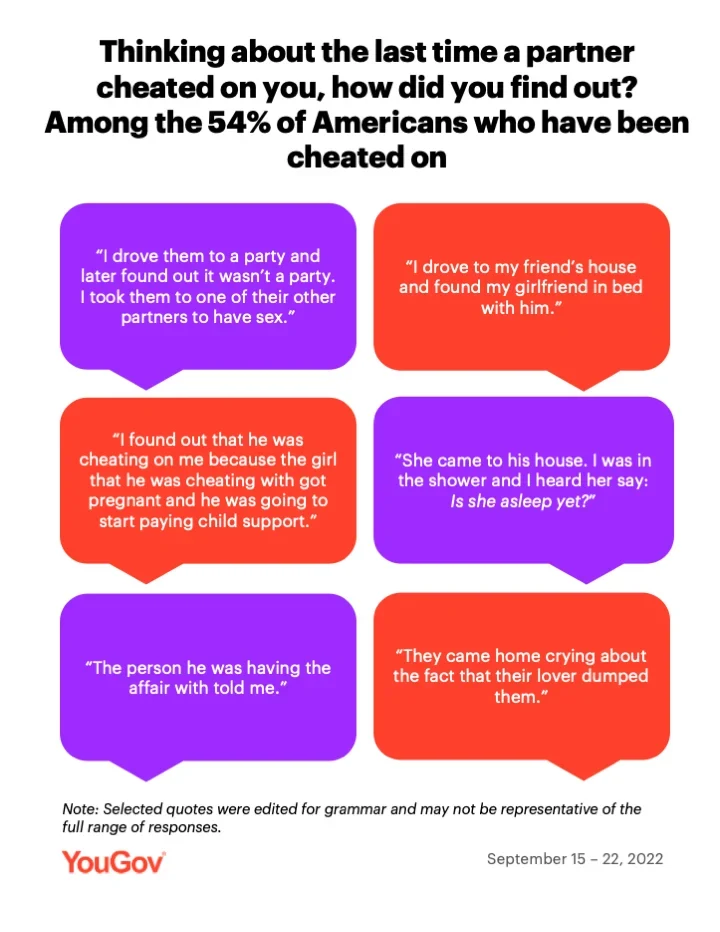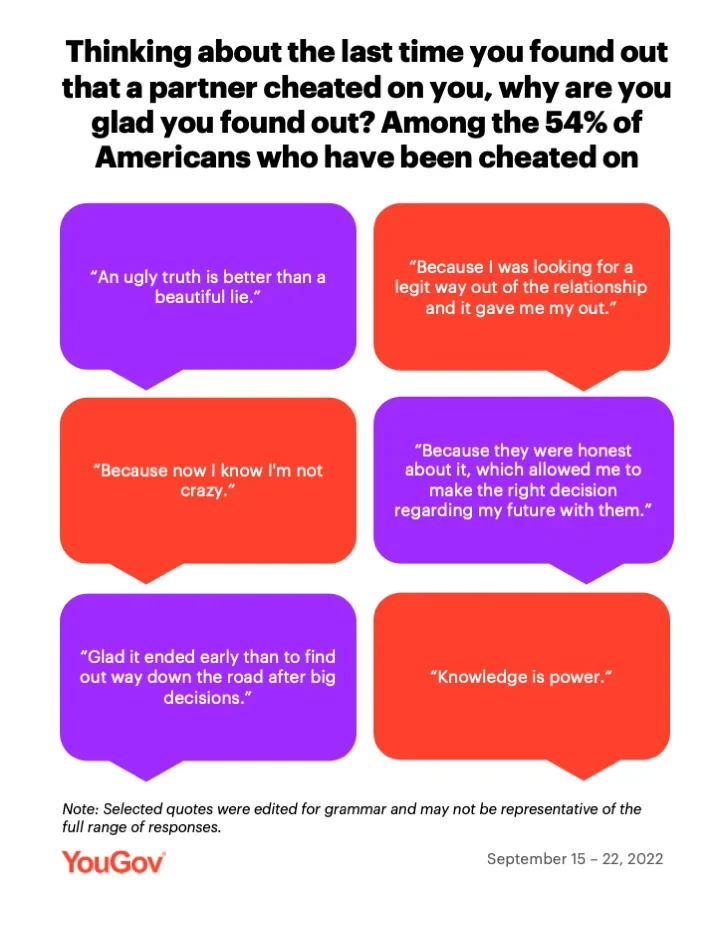With the share of Americans who are single on the rise in the past few decades, what are Americans’ feelings about monogamous relationships, and how monogamous are those relationships in practice? A recent YouGov survey asked Americans about their attitudes toward monogamy and their experiences with cheating or being cheated on by a partner.
Three in four Americans say they have ever been in a monogamous relationship with someone and 51% say they are currently in a monogamous relationship. While monogamy is generally understood as both partners agreeing not to have any other partners, opinions on what is considered cheating in a monogamous relationship vary. YouGov asked Americans which of 10 hypothetical actions they would consider cheating if done by someone who is in a monogamous relationship.
Nine in 10 Americans say that having sex with another person or sending nude photos of oneself to another person is cheating. Majorities of Americans also consider most of the actions listed as cheating, including sending suggestive online messages to another person (83%), lying about spending time with another person (80%), and forming an intense emotional attachment to another person (73%). About one in four (23%) consider all 10 actions to be cheating — including 20% of people who say they have ever cheated and 28% of people who haven't, suggesting people who take actions many consider cheating are also stricter about what they count as cheating. Across each of the 10 actions, women are more likely to say the action qualifies as cheating than men are.
How many Americans have cheated on a partner while in a monogamous relationship?
Having ever been cheated on is apparently more common than having ever cheated — even though not everyone who has been cheated on knows it. Most Americans (63%) who have ever been in a monogamous relationship say they have never cheated on a partner; one-third (33%) say they cheated — either physically, emotionally, or both. However, when asked about their experiences being cheated on, more than half (54%) of those who have ever been in a monogamous relationship say they have been cheated on — either physically, emotionally, or both.
When asked about the most recent relationship in which they cheated, 59% of Americans who say they have ever cheated say they only cheated with one other person, 16% say they cheated with two other people, and 7% say they cheated with three other people.
YouGov also asked Americans about their experience being on the other side of cheating — that is, being the person somebody else cheats with. Men and women are equally likely (42%) to say that someone has cheated on their partner with them, but men are slightly more likely to say they knew that the person was in a monogamous relationship when they first became involved with them (44% of men vs. 39% of women). Of Americans who are aware of having been in this situation, 82% say they have also cheated on a partner and 65% say they have been cheated on by partners while in monogamous relationships, suggesting that people who have been cheated on are less likely to become involved with people in monogamous relationships, compared to people who have cheated before. However, Americans who have been “the other person” are also more likely to have cheated on a partner and more likely to have been cheated on, compared to Americans who have not been in this situation (60% vs. 37% and 79% vs. 19%, respectively).
What happens in the aftermath of cheating?
More than half (57%) of Americans who say they ever cheated say that at least one partner they cheated on found out that they had been unfaithful, and the same share say at least one partner never found out about their cheating. In most cases (71%), Americans who ever cheated say they did not want their partners to find out about their cheating.
YouGov also asked Americans who said they have been cheated on to share how they found out about their partners cheating. Many Americans say they found out from the partner themselves, but others had more complicated stories. Two-thirds (67%) of Americans who ever cheated on a partner were not broken up with by their partners, including 54% of Americans whose partners found out about their cheating and 88% of Americans whose partners did not find out about their cheating. However, most Americans who were broken up with because they cheated appear to have been given a second chance: 58% of Americans whose partners broke up with them because of their cheating say they eventually got back together with the person.

But are Americans who cheat sometimes the ones who end the relationship? When asked if they ever broke up with someone after cheating on them, 43% of Americans who ever cheated say they have. Women (48%) who have cheated are more likely to break up with someone after cheating on them compared to men who have cheated (39%).
As for breaking up with someone who cheated, three in four Americans who say they have ever been cheated on say they have done so, and one in five say they have never broken up with a partner who cheated. Women are slightly more likely to break up with a partner who cheated on them, compared to men. However, more than one-third of Americans (39%) who broke up with a cheater say they eventually got back together with them, with women (42%) being slightly more likely to do so than men (36%).
Half of Americans (52%) who have ever been cheated on say that a partner broke up with them as a result of their having cheated, with men being more likely to say this has happened to them compared to women.
Four in five Americans who have been cheated on say they are glad they found out about the cheating, including 83% of women and 79% of men. Some Americans’ reasons for being glad they found out, as provided in response to an open-ended question, are listed below.

Have Americans’ current relationships survived past cheating?
YouGov also asked Americans who are currently in monogamous relationships whether they have ever cheated on their current partners, and whether their current partners have ever cheated on them. More than four in five Americans with monogamous partners say they have never cheated on their current partner, with women (90%) more likely to say so than men (80%). The share of people who say they cheated on their current partner — either physically, emotionally, or both — is higher for adults who are in a casual relationship (36%) and for adults who are living together but are not married (26%), compared to adults who are married (13%).
Almost one in five (18%) Americans who are currently in monogamous relationships say their current partner has cheated on them — physically, emotionally, or both. Americans who live with their partner but are not married (35%) are the most likely to say they have been cheated on by their current partner.
Are patterns of cheating among Americans a reflection of more general attitudes toward monogamy?
While monogamy may still be the most popular approach to relationships, the past several years have seen an increase in Americans’ interest in non-monogamous relationships. In the most recent YouGov survey, about one in four Americans say they have been in a non-monogamous or open relationship at some point.
What kinds of relationships would Americans consider? Two-thirds (66%) say they would only ever consider being in a monogamous relationship, 15% say they would consider being in both a monogamous and a non-monogamous relationship, and only 3% say they would only consider non-monogamous relationships. Women (73%) are more likely than men (57%) to say they would only ever consider being in a monogamous relationship. The likelihood of only ever considering monogamous relationships decreases with age, with adults under 30 being the least likely to only consider monogamous relationships.
– Carl Bialik, Taylor Orth, and Linley Sanders contributed to this article
The poll was conducted among 2,000 U.S. adult citizens on two separate surveys conducted from September 15 - 19, 2022 and September 19 - 22, 2022, with each survey conducted among 1,000 U.S. adult citizens. Explore more on the methodology and data for this poll.
Image: Getty (Cravetiger)










